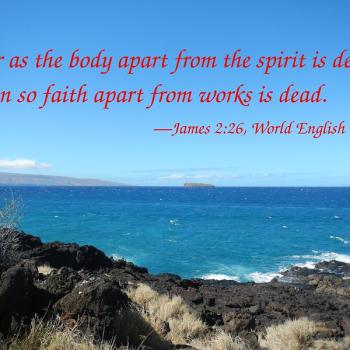
The Good Samaritan, by Augustin Théodule Ribot (1823-1891) [public domain / Wikimedia Commons]
***
This is a vigorous dialogue that took place on my Facebook page, starting with criticism of my Facebook dialogue: Dialogue with an Atheist as to Whether or Not Mormons are Christians. My main Catholic counterpart’s words will be in blue. A Presbyterian friend’s words will be in green.
*****
I’m with the atheist on this one. For me, a Christian is anyone who sincerely follows Christ. If they act like a Christian, baptized or not, Trinitarian or not, etc., and they consider themselves Christian, who am I to say they’re not? :-)
Christians believe in certain doctrines, by definition. If you are a Catholic, you say the Nicene Creed or Apostles Creed at every Mass. Protestants have creeds and confessions as well, and most would hold to the Nicene Creed and Athanasian Creed, which are both explicitly trinitarian.
Denying the Trinity introduces innumerable biblical difficulties. Jesus Himself denies that all who think they are sincerely following Him really are:
Matthew 7:14-27 (RSV) For the gate is narrow and the way is hard, that leads to life, and those who find it are few.
[15] “Beware of false prophets, who come to you in sheep’s clothing but inwardly are ravenous wolves.
[16] You will know them by their fruits. Are grapes gathered from thorns, or figs from thistles?
[17] So, every sound tree bears good fruit, but the bad tree bears evil fruit.
[18] A sound tree cannot bear evil fruit, nor can a bad tree bear good fruit.
[19] Every tree that does not bear good fruit is cut down and thrown into the fire.
[20] Thus you will know them by their fruits.
[21] “Not every one who says to me, `Lord, Lord,’ shall enter the kingdom of heaven, but he who does the will of my Father who is in heaven.
[22] On that day many will say to me, `Lord, Lord, did we not prophesy in your name, and cast out demons in your name, and do many mighty works in your name?’
[23] And then will I declare to them, `I never knew you; depart from me, you evildoers.’
[24] “Every one then who hears these words of mine and does them will be like a wise man who built his house upon the rock;
[25] and the rain fell, and the floods came, and the winds blew and beat upon that house, but it did not fall, because it had been founded on the rock.
[26] And every one who hears these words of mine and does not do them will be like a foolish man who built his house upon the sand;
[27] and the rain fell, and the floods came, and the winds blew and beat against that house, and it fell; and great was the fall of it.”
St. Paul also warns about those who follow “another Jesus” (Mormonism is nothing if not that!):
2 Corinthians 11:4 For if some one comes and preaches another Jesus than the one we preached, or if you receive a different spirit from the one you received, or if you accept a different gospel from the one you accepted, you submit to it readily enough.
I know all this. Really, I do. I agree with you on most everything and I have several of your books which I have used to write my theology papers. I understand the theological differences and the problems that would occur if a Trinitarian and a Mormon intended to marry and that if a Mormon wanted to convert, that they would have to be baptized. Of course I agree with that. I’m just a tad liberal on labels. ![]()
And you’re a Certifed Catechist in the Archdiocese of Miami? Surely, you are joking in this sub-thread, to generate discussion, right?
Yes I am a Certified Catechist in the Archdiocese of Miami and no, I am not joking.
We can’t be more liberal on labels than Jesus or Paul were. They warn about false prophets and wolves in sheep’s clothing, and heretics, and talk about truth and those who are divisive and rebellious and refuse to submit to the Church’s and the Bible’s / tradition’s teachings.
Some of my Mormon friends act much more Christlike than my Catholic or Protestant friends.
Of course they could act more Christlike in individual situations, just as an atheist can and often does. So what? That proves nothing whatever. They still must believe in Christian basic doctrine.
And you can catch more flies with honey than you can with vinegar. An open door means a discussion can take place. I rather open them than slam them. (I am not saying that you are doing that.) All goodness comes from Christ. He can work through anyone, whether they believe in Him or not. ![]()
We can’t pretend that someone is a Christian when they are not. That’s neither honest nor loving. We can freely grant (as I always do unless I can no longer do so from hard contrary evidence) that they are sincere, nice, well-intended, loving people with many good qualities, etc. We can hold off on saying such “controversial” things as long as possible (I do that too), but if we are asked straight out, we can’t be dishonest about it.
Now Christians are widely despised in secular America if we dare to say that a homosexual “marriage” is in fact no marriage at all. That’s immediately classed as “hateful” and “bigoted” and intolerant. So we are supposed to ditch the sacrament of matrimony just to become fashionable and well-loved by all? Jesus predicted the exact opposite state of affairs, when we proclaimed His truth:
Matthew 10:16-25 “Behold, I send you out as sheep in the midst of wolves; so be wise as serpents and innocent as doves.
[17] Beware of men; for they will deliver you up to councils, and flog you in their synagogues,
[18] and you will be dragged before governors and kings for my sake, to bear testimony before them and the Gentiles.
[19] When they deliver you up, do not be anxious how you are to speak or what you are to say; for what you are to say will be given to you in that hour;
[20] for it is not you who speak, but the Spirit of your Father speaking through you.
[21] Brother will deliver up brother to death, and the father his child, and children will rise against parents and have them put to death;
[22] and you will be hated by all for my name’s sake. But he who endures to the end will be saved.
[23] When they persecute you in one town, flee to the next; for truly, I say to you, you will not have gone through all the towns of Israel, before the Son of man comes.
[24] “A disciple is not above his teacher, nor a servant above his master;
[25] it is enough for the disciple to be like his teacher, and the servant like his master. If they have called the master of the house Be-el’zebul, how much more will they malign those of his household.”
And what good is it to be a Christian when [one] does not act like it?
Yeah, we must act like Christians. Did you think I would disagree with that? Right now we’re talking about the creedal / doctrinal definition of a Christian: not the manifest fact that Christians sin a lot and are often hypocrites. That’s why we start every Mass in the way we do, with group confession of sin.
I recently had a lengthy discussion with a Mormon. From a Protestant perspective, no Christian in history has believed the things she believes about Jesus Christ; that God was once a man born on the planet Kolob, and not eternally God; that there are other scriptures given by some other “prophet” besides the Bible that guide us, that Jesus is our model for becoming gods of our own planets, etc. Anyone can have and practice Christian values; it the person of Jesus Christ, who He is and what He has done that defines what one should believe about Him, not some “other” scriptures that teach strange things.
I wish I had saved that discussion because it was very lengthy. Her husband got very upset with me for being so sure that Joseph Smith wasn’t a prophet, that I had “insulted” her by saying she cannot be a Christian and believe the things she does, but I didn’t insult anyone–just insisted that Christendom doesn’t involve the things she believes and teaches. We cannot coddle someone in their unbelief. That is the definition of cruelty.
I agree with all of you theologically. I just don’t see the point in telling someone they are not a Christian. It comes off sounding like we think we are better than them. I think we can find other ways to open the discussion and bring them in than by doing that. I think we can make a distinction with them between our dogmatic beliefs and our actions.
Our actions should flow from our dogmatic beliefs.
They should, but [it] is not often the case.
The fact that others’ actions flow from values similar to our own doesn’t make them Christians.
Look, I’m the first to admit that Mormon theology is screwy, but how many non-Christians say that about us? Pointing out the faults in a belief system can only be done once common ground is found. And that is our moral law, which Jesus commanded us to teach. I just think we should start there and progress forward.
Again, I said above: “We can hold off on saying such “controversial” things as long as possible (I do that too), but if we are asked straight out, we can’t be dishonest about it.” We can be nice as can be, but what we cannot ever do is agree in redefining Christianity or in asserting that the Trinity and monotheism are expendable doctrines. As soon as (or if) those come up, we have to be honest and call a spade a spade.
Dave would see Protestantism as within Christendom without a new “prophet” or a new “book of scriptures.” He would say my system is wrong, but he’s unlikely to say that we have a different Jesus all together. Such is the case, however, with Mormons. Just because someone uses the name “Jesus” in their religion’s title doesn’t make them Christian. Not to mention, what good do we do someone to confirm them in their unbelief and sin?
That’s all correct. You and all trinitarian Protestants are Christians. Mormons, Jehovah’s Witnesses, Christian Science, and all the other groups that deny essential Christian doctrines are not. And back when I was an evangelical cult researcher in the early 80s, we regarded Catholics as Christians (as did Walter Martin, author of “Kingdom of the Cults”) — thus saving ourselves lots of effort in anti-Catholic research!
True! Many Protestants regard Catholics as not being Christians based on our beliefs. Very sad. I see people as individuals. Most of my Mormon friends act like Christians. I am not saying that all Mormons are Christians, and I am not saying that all [are] Trinitarians are either. For me, actions speak louder than words. ![]()
You make an unbiblical dichotomy between beliefs and actions. The Bible and Catholicism (and other Christians) always insist on both things: we have to believe as Christians do and act as Christians ought to act. Failing on either count can land us in hell in the end. Moderns typically under-emphasize doctrine and belief-systems, because that is the society we live in. This entire discussion is strong evidence of this problem today. We want to ignore the hard questions of honest disagreements in beliefs, and are so reluctant to ever classify anything as error or heresy. We can be as nice as we can be; believing in the Trinity doesn’t require someone to be an ogre and dastardly moron.
You’re talking about being a fully consistent Christian in all respects (and I agree: “you will know them by their love”). We are talking about being doctrinally or creedally or sacramentally a Christian (baptism).
Dave, I want all people on planet Earth to be Catholic. But that is only going to happen when they will listen to us. And I do not believe that only Catholics and only Trinitarians will be saved only because we are Trinitarians. Claiming Christ while doing nothing about [it] is a mockery of His sacrifice for us.
I lost my Mom when I was 15. That is objective reality. If I had insisted that my Mom was still alive, would it have been kind of my family to encourage that belief? Or would it have been cruel of them? Likewise it is manifestly an objective reality that Mormonism isn’t Christian. It is cruel of us to affirm Mormons in their mistaken belief that they are true disciples of Christ.
I’m not saying that we should leave them there. I have never said that.
No one is saying “only because” but trinitarianism is part of the “because”: believing in the incarnation and “Jesus is Lord.” If someone doesn’t believe that, they better think about it very seriously, because that is serious business. The Bible does not look favorably upon heretics at all. But it’s “both/and.” You want to play the “either/or” games. That outlook is not biblical and not Catholic.
Both orthodoxy [correct doctrine or belief] and orthopraxy [correct practice] are required for the Christian.

















